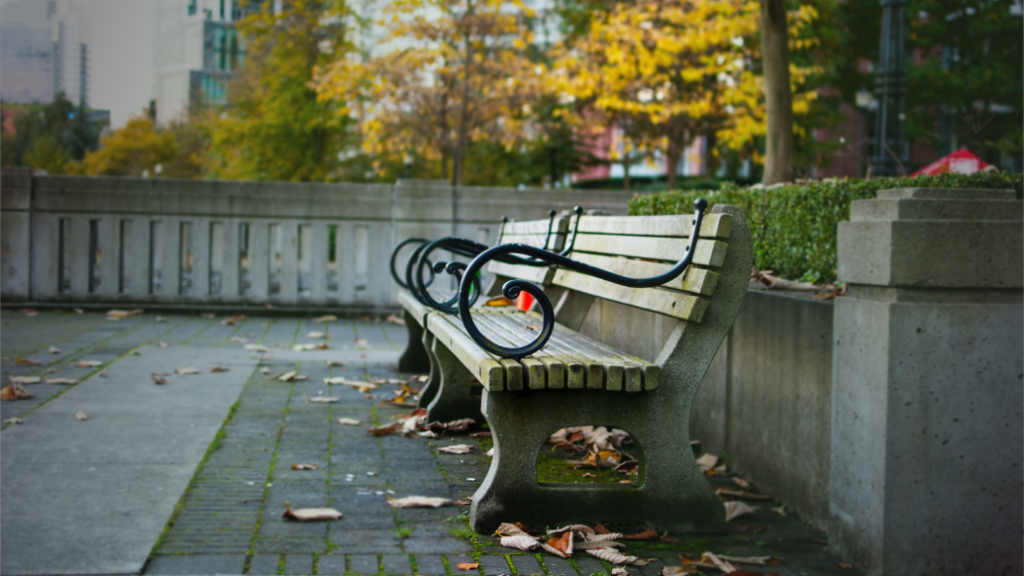When I drive by Kennedy Park, close to my neighborhood, there are only blankets, torn and dirty on that green wood bench. Usually, that bench holds a person beneath those blankets. Someone whose face I’ve never seen: hands yes, scuffed boots yes, winter jacket yes, but no face.
On March 13th, the college where I teach ended on-site classes due to Covid-19 found, confirmed in the state. The students were asked to evacuate, to return home.
Maine’s governor, Janet Mills, later, due to the virus, designated the state as one of emergency. I immediately thought of where that person would go, if they’d remain on that bench in tumultuous rest, sleep. Where would the most vulnerable of us go? Would they persist in this pandemic, among this virus set to infect silently, to kill?
That park, which was established in 1862, was the first place I sat out-of-doors when I came to Lewiston almost two years ago. I sat on one of the wrought iron benches to eat a sandwich I’d purchased nearby. I noticed the teal roofed gazebo in the park’s center, its almost reflection of the sky. I noticed other people sitting on various benches staring at the crows on the grass. Some were marijuana high, drifting about in the clouds, others had other highs that made them curse constantly: noise, the anger of their circumstances, all of that new liquid in their veins. A small group of boys and young men played basketball on the courts, part of that same park. And that person on the green bench, covered in blankets was there as well. That person was the only one covered in blankets, yet it was August and sweltering. Many of those in the park were immigrants from Somalia, Kenya, and the Congo but there were locals too, all enjoying that day or waiting for the next, hoping that the next would be one to enjoy.
In that park, on Tuesdays, Somali farmers sold vegetables on two, sometimes three longish tables. There I’d often buy red onions, heirloom tomatoes, and collards or Swiss chard. The woman seller, in the red hijab, would always give me three free poblano peppers and smile.
After visiting the farmers, I’d sometimes bring a small bag of apples and discreetly leave it at the foot of the green bench. I’d hoped the person occupying it, when that person emerged from their blankets, would see the bag, take it, open it, eat the apples. I’d assumed, hoped others were doing similar deeds. I’d seen kindness, capriciously, in that park and around town.
But, now, when I pass in my car, I don’t see that person. And now, this reality makes me more anxious of that person’s absence. What does this mean? What does this mean now? Now, when the park is closed. Now, when I see those long-dead elm trees no longer there, leafless? Now, when our president blunders, and lies about the blundering, and blames everyone else? Now, those blankets are still there. They are still torn and dirty.
I’m locked in my apartment, social isolating. I’m writing lines of poems I’ll toss away, if not burn. I’m reading Albert Camus’ The Plague. I’m contemplating re-reading, Giovanni Boccaccio’s The Decameron. I’m practicing social distancing. And when I rarely leave to gather groceries, over my hands I wear surgical gloves and tie a bandana around my nose and mouth—old-western-bandit style (because one can’t buy masks due to shortages) to protect others and myself. We are hiding even more of what we feel, even more of who we are.
But is that person, away from the bench, protected from this? Was that person ever protected? Are any of us? Is this the question of the pandemic? Is this the struggle? I keep asking myself this. But then, I return to the bench and the crows surrounding it, the crows walking in the tattered park grass, the crows flying about the park. I’m then back to the person not on the bench, back to what is now and what remains torn and dirty.




